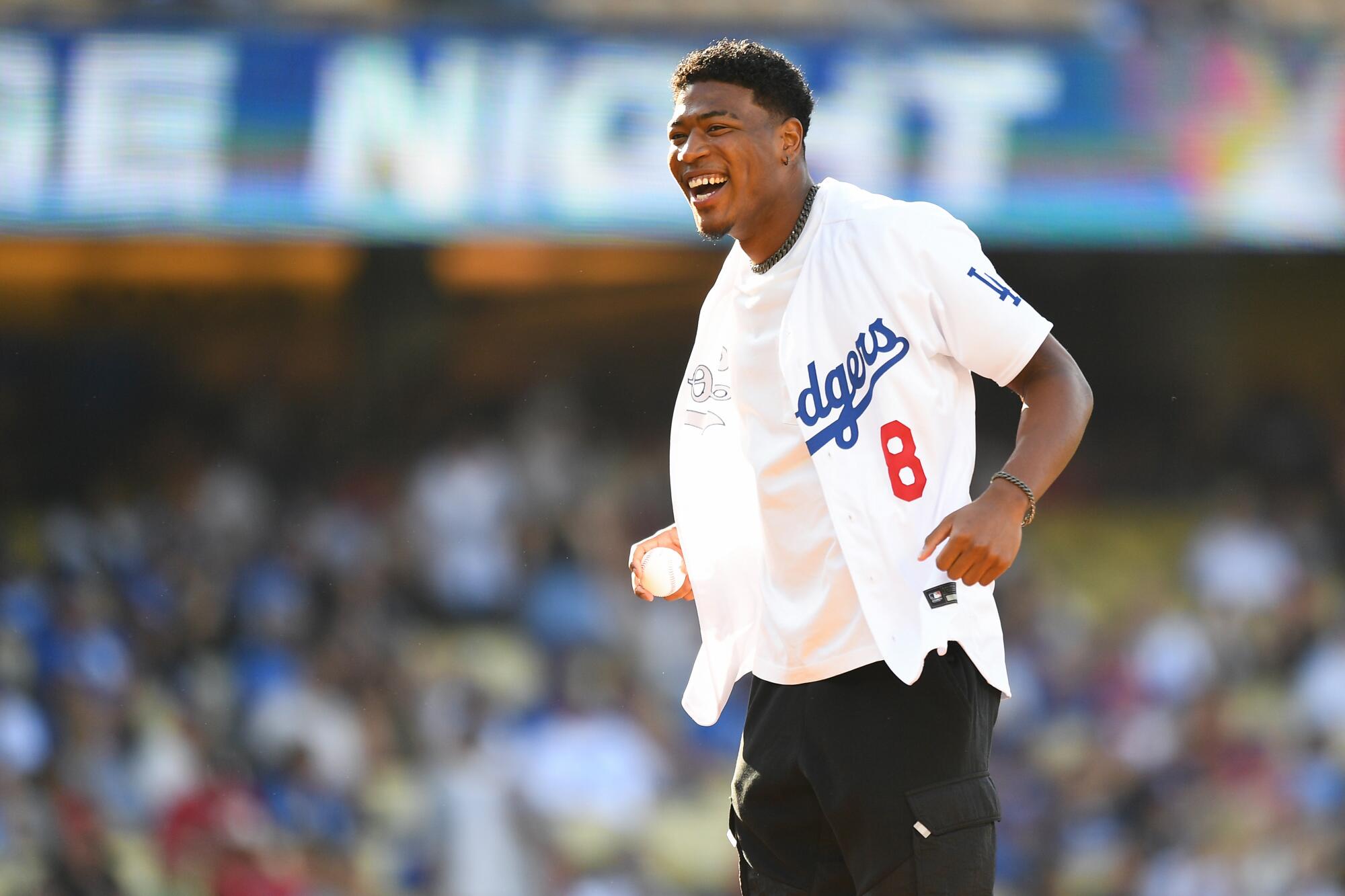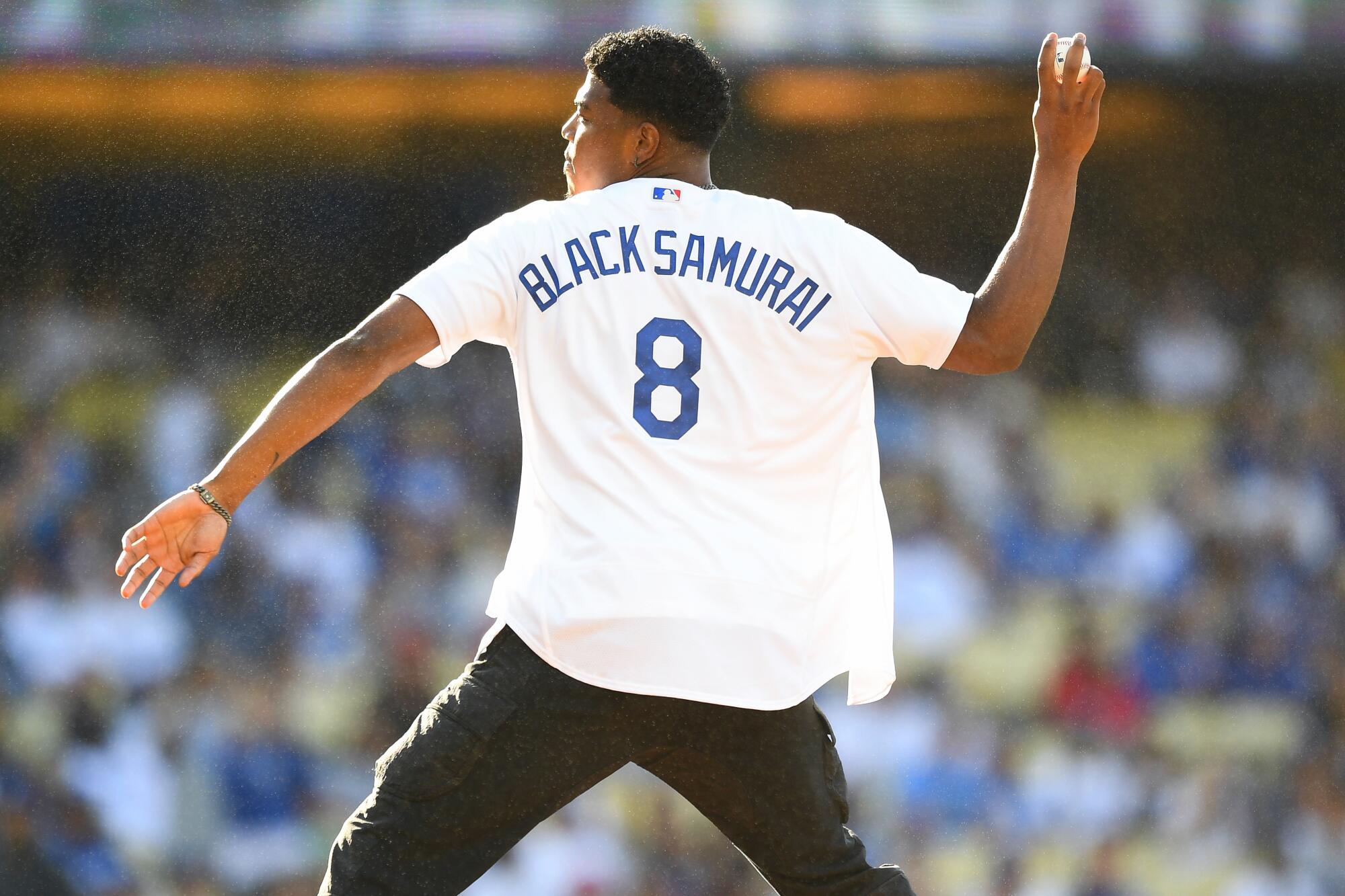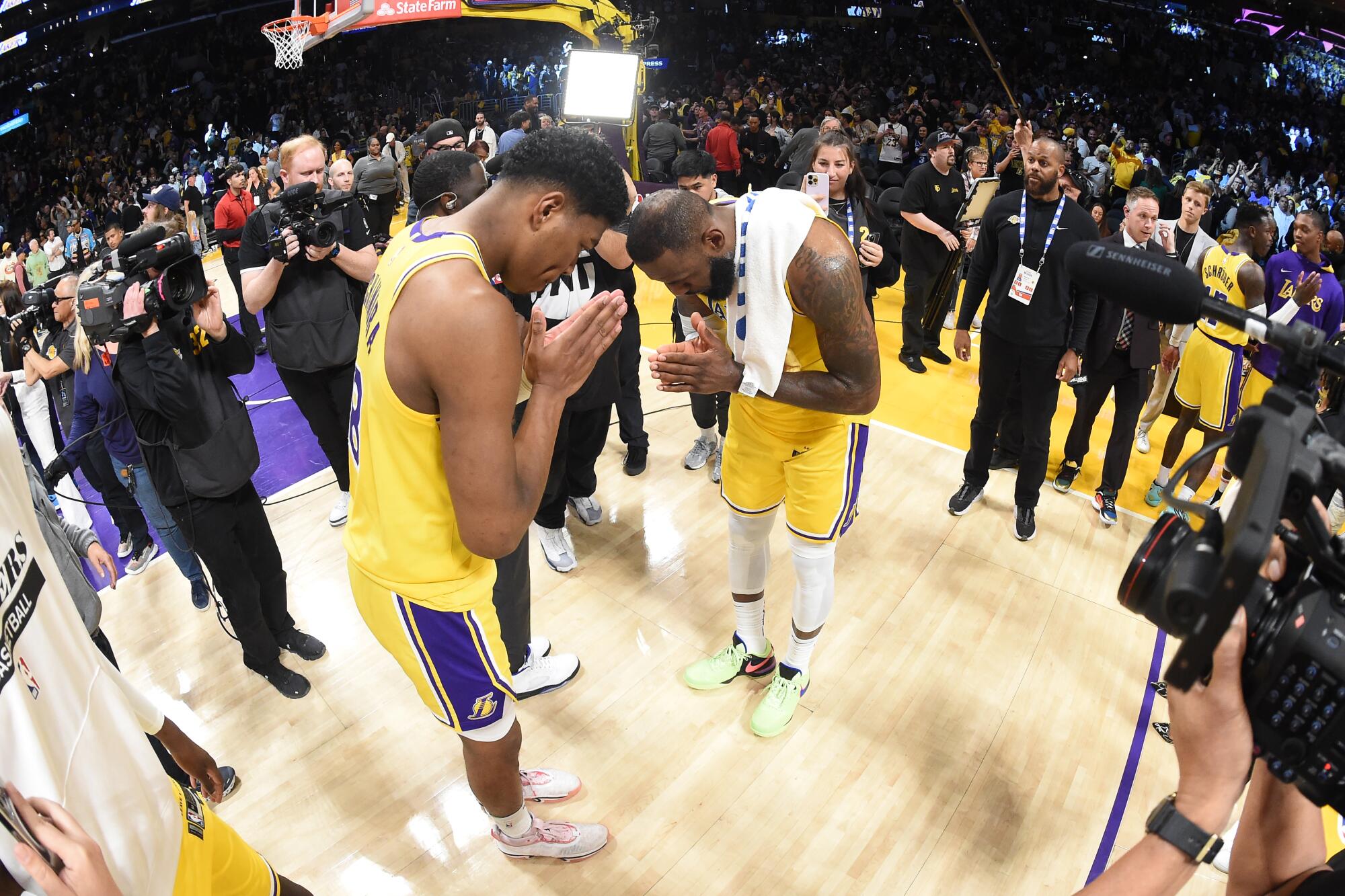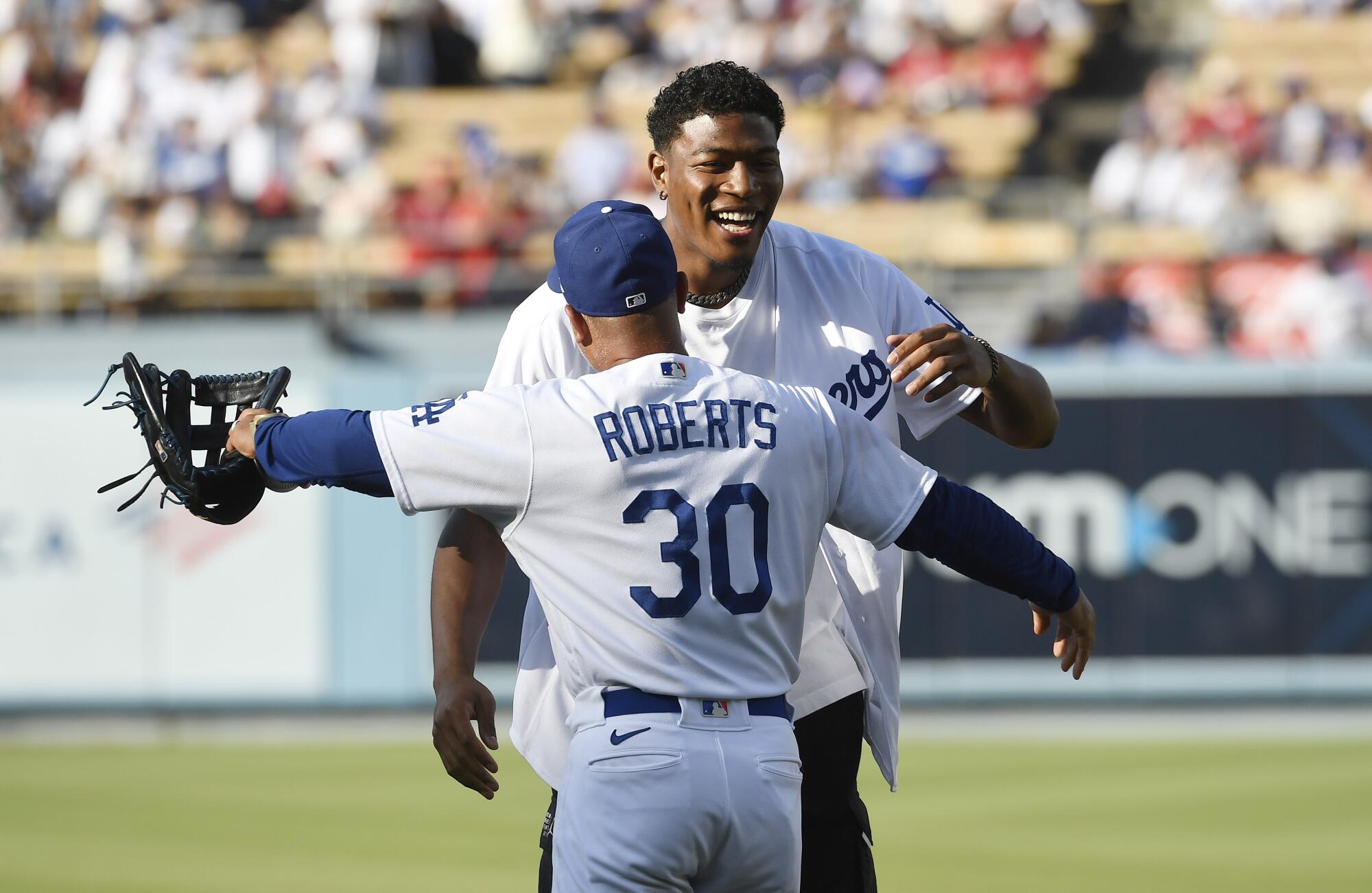
- Share via
Rui Hachimura took the field in front of a crowd that would grow to more than 50,000 as he soaked in more than the sunshine.
The boy named by a baseball-loving grandfather stood on the pitching mound of one of the game’s most iconic stadiums, his heart pumping as a wide, anxious smile hit his face.
As he got ready to throw the first pitch on Japanese Heritage Day at Dodger Stadium, he urged the crowd to cheer. Down the first base line, he noticed Angels star Shohei Ohtani pause his stretching routine to watch.
With “Black Samurai” printed on the back of his brilliantly white Dodgers jersey, Hachimura went into a windup and delivered the pitch.
“I was nervous. I didn’t think it was going to be crazy, but it was A LOT of people,” he told The Times. “I forgot that was a big game because of Shohei. … I was kinda nervous. I started shaking.”

A lifetime ago, this was the dream — Hachimura playing professionally on a diamond. He was once a boy who threw so hard that his coaches made him play catcher because no one on the team could handle his fastball.
In that moment at Dodger Stadium last summer, Hachimura felt that rush, the pride of a grandfather who had long ago passed.
He’d made it to the big leagues — and he only got there because he quit playing baseball.
The ties between Japan’s baseball-crazy culture and Los Angeles have never been tighter.
First, the Dodgers won the Ohtani sweepstakes with a jaw-dropping $700-million contract. Then they signed another sought-after Japanese star with a $325-million deal for ace Yoshinobu Yamamoto.
As news of the Ohtani deal hit the Lakers’ locker room, players marveled at the size of it — they were, at the time, draining their tanks to try to earn a bonus of $500,000 per player by winning the in-season tournament. So when the two-way baseball star signed the largest contract in history, the Lakers noticed.
And after the astonishment over the contract’s deferred-payment structure subsided, a new emotion hit Hachimura.
“I’m proud of being Japanese as an athlete, came from there, grew up and came here to the U.S. to be in the NBA, the top league in the world,” he told The Times. “It’s different sports, but I’m in one of the biggest organizations in the world. The Lakers. And also him as well. Baseball. Top league. Dodgers one of the biggest organizations. As a Japanese, I’m really proud of him and happy for him. He actually motivated me.”

He’s not the first baseball player to push Hachimura. As a child in Japan, he and his friends idolized Ichiro Suzuki.
“Everyone wanted to be like him,” Hachimura said.
His grandpa, Hero-o, picked the name Rui because it means “base” in Japanese. And before he got too sick, he bought his grandson a mitt and a ball and the two would play catch.
A natural athlete, Hachimura played a little soccer. He did karate. He tried (and hated) basketball — “too much running.” And, most prolifically, he was an elementary school track star, reaching the national semifinals in the 100-meter dash.
Yet nothing compared to baseball.
“Yeah, I really liked it,” he said before correcting himself. “Loved it.”

He excelled — so much to the point that he considered enrolling in a baseball academy before ultimately deciding to continue playing with his elementary school team.
“I could hit. A pretty good hitter. A home run hitter,” he said. “I was so fast so I could just steal every base easy. I was that type of a kid.”
But his body didn’t respond. His ankles, his hamstrings, his back, they all ached.
“I was too fast. My body couldn’t catch up. And I got tired of it,” he said. “… It started feeling like it was boring. And I was going to be pretty good, but it didn’t feel like the one.”
And there was a looming pressure to pick “the one” at Okuda Junior High.
Hachimura said once you enter junior high school in Japan, you need to pick some kind of lane — a “club” that could be a sport or an art or an academic field.
“I was like, ‘I don’t know what I want to do.’ But I knew I wasn’t going to do baseball,” he said. “The baseball team came, they tried to push me. ‘Rui, play baseball,’ but I’m good. So I thought about track and field, but that junior high school team … they really didn’t do anything.
“… I was tired of it.”
It was a lot — and it almost broke him as he entered his teenage years.
“There are like tryout weeks — but I didn’t go to anything. I don’t think I’m going to do anything. Maybe just quit. Be regular, normal people. … And then in the class … those guys actually asked me to play basketball. This guy was so annoying. Everyday, ‘Rui, play basketball.’ Everyday I’d go to school, those weeks, I’d go to school. Sit in my chair. ‘Rui … basketball?’

“After class, there’s a 10-minute break, he comes to me. ‘Rui, come on.’ Lunch break, ‘Rui, come on.’ After class, ‘Rui, let’s go.’ And I was like, ‘No, no, no’ for like two straight weeks. And I got so annoyed. ‘Stop. I don’t want to do it.’”
But Hachimura’s friend, Shotaro Okayama, persisted. Behind the scenes, coach Joji Sakamoto was pushing for it.
“People knew I was a good athlete and people were confused why I didn’t do anything. I was tall, but not tall-tall. But the coach saw it,” Hachimura said. “His name was Sakamoto. He was a big basketball guy, he watched the NBA. And he told [Okayama], ‘You’ve got to bring him.’”
Eventually he went, and right away, he found his thing. That night he went home for validation.
“Mom, what do you think if I play basketball?” he asked.
“I think it’s pretty good, no? … Let’s try it,” she encouraged him.
“All right,” he thought. “Let’s go.”
Last July, days after Hachimura signed a three-year, $51-million deal to stay with the Lakers, he readied himself to take the mound.
“I was actually nervous. I’m not going to lie,” he said with an earnest laugh. “Because of that, I had to practice. I hadn’t done it in a while. I had to go buy gloves and everything and go practice with my friends.”
Hachimura and his friends found a local high school diamond where he once again held a baseball, the white leather comfortably sitting against his overgrown hands.
With Ohtani wearing a Dodgers jersey, Hachimura expects to think about baseball even more, two of Japan’s biggest stars in the same city. The two have met a few times, with Ohtani attending one of Hachimura’s games when he played with the Washington Wizards.
“He has my mind-set, always trying to be the best,” he said of Ohtani. “… I want to play here for a long time and be a part of this organization. We can motivate each other to be the best.”
Hachimura, who turns 26 in February, is finding out how to be the best version of himself playing with LeBron James and the Lakers, a big-game player consistently making an impact despite some bad luck.
His season already has been interrupted by a concussion and a broken nose that required surgery — an injury that has Hachimura still playing behind a protective mask, as long as he doesn’t forget it at the scorer’s table.
He’s settled into the locker room, a popular voice with a great sense of humor. Told that Times columnist Dylan Hernandez speaks Japanese well, Hachimura looked at the English-speaking reporter with a raised eyebrow before asking the logical question: “How would you know?”
When he took the mound at Dodger Stadium, James shared video of Hachimura’s pitching routine, which included a shakeoff of Dodgers manager Dave Roberts and a smooth leg kick.

“Man,” James posted, “this dude is hilarious.”
That pitch, though, meant more — a full-circle moment for Hachimura and nice final note for the baseball life his grandfather envisioned.
“He’d have been so happy,” Hachimura said.
More to Read
All things Lakers, all the time.
Get all the Lakers news you need in Dan Woike's weekly newsletter.
You may occasionally receive promotional content from the Los Angeles Times.









